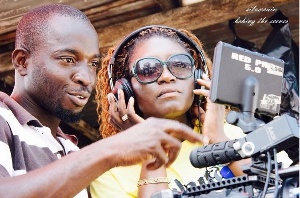 juilet Asante,right with a cameraman
juilet Asante,right with a cameraman
Once you learn about Juliet Yaa Asantewaa Asante, you may call her the “Oprah Winfrey of West Africa.” However, Juliet’s story of success is not only unique; it could be a fascinating film of it’s own.
Juliet Asante is an award-winning and renowned Ghanaian actress, talk show host, film and television producer and film director.
When Asante directed the film SilverRain, it was filmed in Accra, Ghana and Johannesburg, South Africa and she recruited and hired talent and crew from countries all over the continent, such as Nigeria, Kenya and Sierra Leone.
The film, which received three nominations at the 2015 Africa Movie Academy Awards, including Best Film, portrays a love story that consciously draws attention to the social class divide between the rich and the poor.
It also advocates for young women working in the Ghanaian marketplace. It focuses on the “Kayayos,” which means “head porter.” They are often young girls that migrate from poor communities to better communities in attempt to make a living.
“I believe in using film as a tool for advocating social change. SilveRain accomplished that and brought a lot of awareness and intervention to the Kayayei in Ghana,” Asante says.
As an adolescent, Asante lived in Liberia. After the civil war, her upper middle class family fled to the peaceful country of Ghana. The family social status changed as they tried to reestablish themselves in a new land. Juliet became saddened as she learned that many of her childhood friends did not survive the war.
However, the challenges and the trauma of war wasn’t her only struggle. Juliet had become disabled. She couldn’t walk. Her mind would often wonder. Her parents would consistently venture to small towns and villages in search of adequate health facilities and treatments. None of the facilities offered a solution, so her family resorted to traditional methods; they sought out a medicine doctor who used herbs and exercises that eventually enabled Juliet to walk. As Asante looks back, she concludes that those experiences strengthened her “backbone.”
As a teenager, Juliet “lived in her mind,” and immersed herself in romance books, which also helped her master the English language. She became fascinated with the stories’ structures, and how the stories were told.
“At that time, I just naturally moved towards film because that was such a powerful tool for the expression of my imagination.”
When she discovered the film industry, she wanted to be in front of the camera. “But as soon as I went into film, I realized that I would love watching the crew.”
She loved the idea of controlling what was seen in front of the camera and came to a realization. “I must control this process; I must make it into a business” she shares.
Today, Asante is the founder and C.E.O of Eagle Production Limited, which has produced television shows, films and workshops that train actors. She has also served as the editor of an entertainment magazine, Entertainment Today, and the president of the Ghana Chapter of Women in Film in Television International. This past fall she taught Mass Communications at the Webster University campus in Ghana.
Juliet’s philanthropic work includes the roles of founder and director for Save Our Women International, a nonprofit organization that teaches sex education to young women, and organizing the Voice Off Africa Forum, which closes “the gap between media entrepreneurs and the investment community.”
In August 2016, she held the first annual Black Star International Film Festival in Accra, Ghana. The festival’s main focus is the business of film. She wanted to address topics that filmmakers often struggle with such as rights, financing and markets.
“We had four thousand submissions, ” she said “Oh my God, it exceeded everyone’s projections.”
Asante’s latest accomplishments include a short mobile movie filmmaking venture called Mobilefliks. She believes could open new doors in distribution for filmmakers. “It did very well and we are working to make this opportunity available to all filmmakers,” she explains.
Advice to Women Filmmakers Asante’s advice to women filmmakers? “Just go on and do it,” she advises,. “Just get a body of work.”
She stresses the need to get out of your comfort zone and be innovative. Come up with a simple story, and invest in sound and a good cinematographer.
Despite her limitations, Juliet made sure to read a lot of books, join film associations, and she contacted people by phone, mail and even visited them in person when she was unable to get a hold of them.
Juliet also suggests expanding your opportunities. Don’t let Hollywood be your only focus. Take advantage of the opportunities in other markets even if it means going international.
She considers having access to several markets as a good thing because it allows you to gain valuable work experience and a body of work that leads you to your ideal destination.